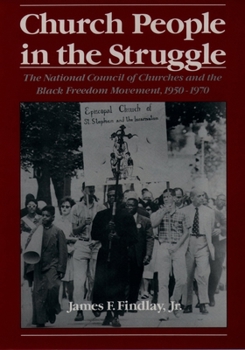Church People in the Struggle: The National Council of Churches and the Black Freedom Movement, 1950-1970
Select Format
Select Condition 
Book Overview
This comprehensive study represents the first effort by an historian to examine the relationship of the mainstream Protestant churches to the Civil Rights movement of the 1960s. Focusing on the National Council of Churches, the principal ecumenical organization of the national Protestant religious establishment, the author draws on hitherto little-used or unknown archival resources and extensive interviews with participants. 21 halftones.
Format:Paperback
Language:English
ISBN:019511812X
ISBN13:9780195118124
Release Date:December 1997
Publisher:Oxford University Press
Length:280 Pages
Weight:0.95 lbs.
Dimensions:0.8" x 6.2" x 9.2"
Customer Reviews
1 rating
Importance of church activity to pass civil rights legislation
Published by Thriftbooks.com User , 17 years ago
This was required reading for a graduate course in American history. While the United States Congress was debating the Civil Rights Act of 1964, many organizations were pressuring the congressmen to support the Act. In the end, Hubert Humphrey believed that the church organizations had been "the most important force at work" 1James F. Findlay surveys the efforts of religious organizations in his article "Religion and Politics in the Sixties: The Churches and the Civil Rights Act of 1964" and tries to show whether Humphrey was correct. The most important organization during the fight to pass the bill was the National Council of Churches. Under its organizational umbrella were many religious based organizations including the Federal Council of Churches which was "the principal Protestant ecumenical body of the early twentieth century and a major advocate of the Social Gospel. The members of the NCC saw the struggle for economic and political justice as their moral duty before God. They saw Jesus Christ as the example of someone who always advocated for the disposed. In the early 1960s they embraced the fight for civil rights. The plight of African Americans in the south fit in with their larger purpose of justice for all. The Protestant Social Gospel movement was alive within segments of the Catholic Church also, particularly in Latin America. Catholics and Jewish groups joined the NCC in their fight for the Civil Rights act. On moral grounds they could not refuse to help. The civil rights movement was largely led by ministers and they invoked the biblical righteousness of their cause. Segregation and violence were obviously against the gospel and many religious people began to see it. Findlay writes about the different methods that they used to persuade congress. The debate lasted ten months but everyday there were large church groups in the gallery and often there were small to large demonstrations in front of congress or in the Washington Mall. There were church services everyday dedicated to the passage of the Act in Washington D. C. and many other places in the United States. Thousands of people wrote letters to their congressmen. Some of the letters are quoted in the article and Findlay remarks that they are the letters of people not used to writing to government representatives. According to Findlay, The organizers knew where all the congressmen stood so they concentrated their efforts in the Midwest and Border States where they could turn some votes. Ministers preached sermons on the immorality of segregation and the equality of men before God. They urged parishioners to write in support of the Civil Rights Bill. There were also roving four-person teams that included a minister, an African American civil rights worker, a legislative expert and a contact person from the NCC. These teams would educate parishioners on the importance of passing the Bill. Findlay writes that there was a profound belief in the hearts of many religious activist





